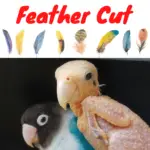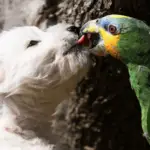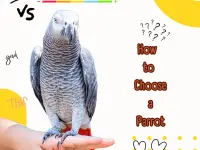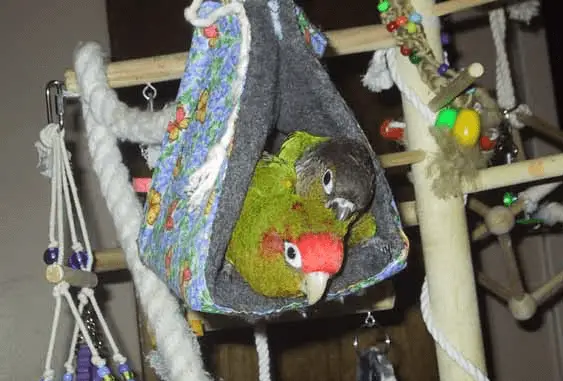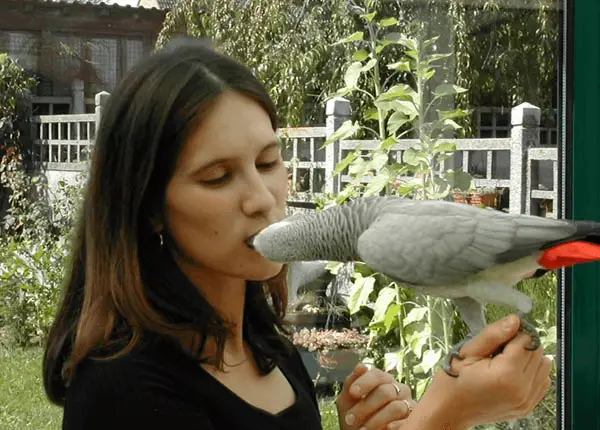Parrot mating The very first thing to know about this ( unchanging ) sexual instinct of the parrot is that it is a monogamous animal, and this, all year long, not only during the breeding season. The parrot will have during its life only one sexual partner ( unless the disappearance of said partner ).
The sexual instinct
Couples are very attentive and considerate of each other and create very powerful emotional bonds ( read: fusional ) for their entire life as parrots or until the death of the companion.
Parrots choose each other, mate in an erotic way, take care of their nest together, and evolve in harmony within a social group – what a real family!
How to deal with that Hormonal Bird
SOURCE:Hagen Avicultural Research Institute
What a HORMONAL BIRD Looks Like!!
SOURCE:BirdTricks
The Parrot “lovers” choices
The parrot is also one of the few advanced animals that choose their “loving” partner. This is partly the reason why, despite the fact that you are completely crazy about your bird, the latter will not necessarily choose you as “lover of the heart” on the simple pretext that you are the one who takes care of him. It is up to you, but this detail is of no particular interest in the choice of the life companion.
From the moment we make our choices and in addition, there are many choices at our disposal, we are free to choose who we want … a human, dog, cat, a companion bird of sex opposite or same-sex. I have often seen, at the shelter I operated, parrots of the same sex forming a couple despite the great availability of partners of the opposite sex and I have often seen, too, birds of the same species and of the opposite sex. having no hooked atom and systematically refusing all forms of intimate contact, even if there were no other birds available around them. It’s part of making your choices … we say that love is stronger than the police!
Parrots are not exclusive and like to live in a group.
Parrot Friendships
Despite all this, normally, the parrot is a gregarious animal that needs to live as a couple within a group. On the other hand, this characteristic in no way prevents him from creating other forms of links, at different levels within his society. It would be wrong to claim that a parrot is an exclusive animal that loves or accepts only one person and rejects or assaults in a natural way all the other members of the social group to which it belongs ( the family ). No parrot would allow itself to do so in its natural habitat.
This kind of behavior, directly related to life in captivity, is more a matter of socialization and the eternal rivalry of the parrot compared to a given group, whether human or with other parrots. The lack of socialization generates great insecurity vis-a-vis its environment or the bonds which connect it to the darling human.
The parrot can choose you as a life companion, you will then become a darling human.
Sex and hormones
In the wild, the breeding season depends on several external stimuli, such as temperature, humidity, photoperiod, and the moment of the parade generally arrives ( at the right time) when there is a great availability of food. to feed the flock of chicks.
When the sexual instinct awakens, strong hormonal surges encourage the birds to reproduce. The search for the companion becomes a priority activity ( if the business is not already concluded). Then, when the choice of companion is finally fixed, and intense court ritual takes hold. These birds can spend hours petting and grooming each other. There follows a very tender and demonstrative display: the male slowly approaches the female with all feathers swollen to give herself the more imposing air (macho birdy), then he tilts his head and his body as a sign of appeasement. The female, if willing, responds positively by also tilting her head and her body and becomes receptive by adopting juvenile attitudes towards her companion. This court can last and last. They stay side by side, walk around while caressing and shouting, and then hop …!
From this moment, the behaviors of birds change: they become more territorial and protective, which does not necessarily mean aggressive! You have to learn to make sense of things …
The sexual instinct in a context of captivity Parrot
Our parrot remains a monogamous animal even in a relationship with its darling human. This need for a companion is as pressing for the free parrot as for the pet parrot. If the bird cannot be housed with a companion of its own species, it will do so most naturally in the world with its favorite human and the latter would benefit from being receptive and available. Indeed, the parrot does not perceive its human as a parent ( mom or dad ), the relationship it establishes is one of a life partner, of “spouse”. The parrot had to trust his “beloved”, you must, therefore, be a stable, reassuring, and above all reliable “husband”.
Coco Jeckill and Coco Hyde?
The parrot that has benefited from good socialization will not reveal itself overnight as a monster simply because its hormones work it! On the other hand, I must admit that it is true that these hormones exert a very strong influence on his behavior. The search for the nest, the sexual seduction, the regurgitation, the masturbation, and the laying of eggs are innate behaviors ( unchanging ) and which must be regarded as normal.
Never reprimand your bird for exhibiting such behavior and if it engages its feelings with you, do not repel it either. Do not provoke envy in your parrot by lavishing it with sexual caresses: on its beak, under the wings or the region of the tail, nor play with its tongue or girdle its body. In the case of masturbation, if the “thing” is already in motion, just let him go after his pleasure from time to time. Modesty does not take place in the world of parrots … So what the hell! … stop seeing bad things!
Parrot Hormonal period = Galley?
No, I don’t think so, in fact, personally, I never had any trouble getting through the seasonal affection periods of my birds. Even though it has often been easier for me to tame a fierce bird during these periods, simply because the hormonal surges are so intense that, in most cases, a fearful-tempered parrot will accept ( willingly ) to be caressed and manipulated during this cycle. The beauty of the thing is, that he learns at the same time that the human is not so formidable and that he can even be a pleasant company. Often this fragile newly acquired confidence continues after the hormonal episodes.
I have never had the right to aggression or other problems so often denounced and which many consider inherent in this condition.
I believe that good socialization ( including satisfactory communication ), respect for the bird’s sensitivity during this period, patience, and a little bit of empathy makes all the difference in the world in what is so often described as being a time of crisis with our pet parrots.
Parrot Hormonal Behaviours and How To Calm Them
SOURCE:Parrot Playhouse

